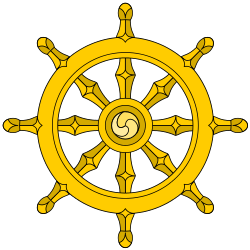Chandrakirti
| Part of a series on |
| Buddhism |
|---|
 |
|
Chandrakirti (IAST: Candrakīrti; traditional Chinese: 月称; pinyin: Yuèchēng; Japanese: Gesshō; Tibetan: ཟླ་བ་གྲགས་པ་, Wylie: zla ba grags pa, Lhasa dialect IPA: [tàwa ʈʰàʔpa] ; c. 600 – c. 650) was a Buddhist scholar at Nalanda Mahavihara in Northern India. He was a disciple of Nagarjuna and a commentator on his works and those of his main disciple, Aryadeva. He was born in Samanta, South India.[1]
Teachings and works
Chandrakirti was the most famous member of what the Tibetans came to call the Uma Thelgyur (Wylie: dbu ma thal 'gyur ) school, an approach to the interpretation of Madhyamaka philosophy typically back-translated into Sanskrit as Prāsaṅgika or rendered in English as the "Consequentialist" or "Dialecticist" school.[2]
In his writings Chandrakirti defended Buddhapālita against Bhāviveka, criticizing the latter's acceptance of autonomous syllogism. He also offered refutations of a number of earlier Buddhist views such as the Vijñānavāda or Idealist school.[3]
Chandrakirti's works include the Prasannapadā—Sanskrit for "clear words"—a commentary on Nāgārjuna's Mūlamadhyamakakārikā and the Madhyamakāvatāra (his supplement to Nagarjuna's text) and its auto-commentary. The Madhyamakāvatāra is used as the main sourcebook by most of the Tibetan monastic colleges in their studies of śūnyatā "emptiness" and the philosophy of the Madhyamaka school.
Chandrakirti the latter
The Tibetan translation of Charyapada provided the name of its compiler as Munidatta, that its Sanskrit commentary is Caryāgītikośavṛtti, and that its lotsawa "translator" was Chandrakirti. This is a later Chandrakirti, who assisted in Tibetan translation in the Later Transmission of Buddhism to Tibet.
Major works
- Prasannapadā (Clear Words) : A commentary on Nagarjuna's Mūlamadhyamakakārikā
- Madhyamakāvatāra (Entering the Middle Way or Guide to the Middle Way)[4]
- Catuḥśatakaṭīkā (Commentary on the 400): a commentary on the 400 Verses of Aryadeva[5]
See also
Notes
- ↑ P. 298 Global History of Philosophy: The Patristic-Sutra Period, Volume 3, By John C. Plott
- ↑ Candrakirti - Budda World. Accessed January 29, 2012.
- ↑ Fenner, Peter G. (1983). "Chandrakīrti's refutation of Buddhist idealism." Philosophy East and West Volume 33, no.3 (July 1983) University of Hawaii Press. P.251. Source: (accessed: January 21, 2008)
- ↑ Ocean of Nectar: The True Nature of All Things, Tharpa Publications (1995) ISBN 978-0-948006-23-4
- ↑ Lang, Karen C. (2003). Four Illusions: Candrakīrti's Advice to Travelers on the Bodhisattva Path. Oxford University Press.
References
- Dan Arnold, Buddhists, Brahmins and Belief: Epistemology in South Asian Philosophy of Religion
- C. W. Huntington, The Emptiness of Emptiness: An Introduction to Early Indian Madhyamaka
- Gyatso, Kelsang. Ocean of Nectar: The True Nature of All Things, a verse by verse commentary to Chandrakirti's Guide to the Middle Way, Tharpa Publications (1995) ISBN 978-0-948006-23-4
External links
- Geshe Jampa Gyatso - Masters Program Middle Way
- Joe Wilson. Chandrakirti's Sevenfold Reasoning Meditation on the Selflessness of Persons
- Candrakiirti's critique of Vijñaanavaada, Robert F. Olson, Philosophy East and West, Volume 24 No. 4, 1977, pp. 405–411
- Candrakiirti's denial of the self, James Duerlinger, Philosophy East and West, Volume 34 No. 3, July 1984, pp. 261–272
- Chandrakiirti's refutation of Buddhist idealism, Peter G. Fenner, Philosophy East and West, Volume 33 No. 3, July 1983, pp. 251–261
- "Philosophical Nonegocentrism in Wittgenstein and Chandrakirti", Robert A. F. Thurman, Philosophy East and West, Volume 30 No. 3, July 1980, pp. 321–337